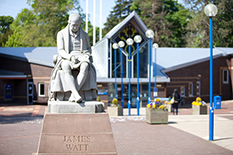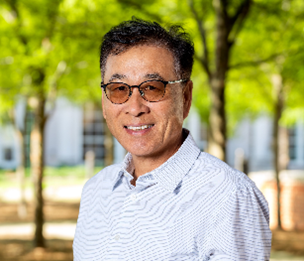News Story
CALCE and Heriot-Watt University Form Research Partnership

CALCE has added another world-renowned institution to its list of research collaborators. Heriot-Watt University sought out CALCE for this new partnership, which pairs CALCE with the Smart Systems Group (SSG) at Heriot-Watt.
The collaboration between CALCE and Heriot-Watt began during Prof. Pecht's August visit to the school where he gave a keynote presentation at The Era of Embedded Intelligence seminar. His presentation, attended by global leaders and innovators in embedded intelligence from industry and academia, addressed how prognostics and health management (PHM) influences future product development, business models, resilience of critical infrastructure, and exploration within extreme environments. Prof. Pecht emphasized the importance and impact that PHM has on society and challenged the audience on how to innovate and train the next generation of engineers, scientists, and businesspeople to prosper in this data-driven age.
Located in Edinburgh, Heriot-Watt University is the world's first mechanics institute and a pioneer for research based on industry demands--including areas of advanced materials, nano-scale structures, microsystems, robotics, smart systems, sensors, and renewable energy. Heriot-Watt helps develop world-class solutions to meet industry needs, and CALCE is joining the effort.
Together, CALCE and Heriot-Watt will tackle the challenges in accurately predicting the remaining useful life (RUL) of electronics within extreme dynamic environments. This includes a myriad of industrial sectors, ranging from aviation, space, subsea and energy, in which high-value assets are used in environments consisting of extreme temperature, pressure, radiation, shock values, and chemically corrosive conditions. A significant, unaddressed challenge exists for accurately predicting the current and future health state of these vital assets when deployed in harsh environments.
CALCE's experience in electronics reliability and experimental analysis will provide valuable insight into the challenges and opportunities in applying PHM methods to electronics used in harsh conditions. CALCE will conduct lifecycle and system analysis experiments to help create a model—informed by physics of failure and data driven analysis. This fusion prognostics model will enable industries to work within a modelling architecture to predict the RUL of legacy and new critical systems with embedded electronics.
Heriot-Watt's team will work with CALCE to deliver the flexibility, resilience, and sustainability that the industry requires. Working together on PHM research, tests, and co-publications, both teams will make regular, short- and long-term visits across the Atlantic.
To build out CALCE's evolving research areas and continue growing worldwide collaborations, Prof. Pecht has joined as chair of the international scientific board for the Offshore Robotics for Certification of Assets (ORCA) Hub--a consortium that includes Heriot-Watt and SSG. Prof. Pecht's advisory role provides an independent, critical review of the work and supports the consortium in developing new research and best practices. PHM sits at the heart of autonomous robotic interventions and self-certification of robotic machines, so due to his expertise in the field, Prof. Pecht will mentor and lead researchers in these challenge areas.
Darius Roman, a Heriot-Watt PhD student, spent a week visiting CALCE labs, lectures, and scholars to kick off the collaboration. During his visit, Darius attended CALCE's failure analysis short course, presented his research to CALCE students and faculty, and discussed his research challenges with the CALCE team. His research focuses on PHM of electronics. Following his presentation, Darius met individually with Professor Pecht to discuss best methods and ideas to contribute to the success of the research project and newfound partnership.
As part of the SSG, Darius' research project involves a prognostic approach that incorporates failure analysis, modelling, condition monitoring, and machine learning techniques. This research will predict the RUL of bottom-hole assembly electronics for oil and gas companies.
Darius will return to CALCE in 2018 to conduct experiments for prognostics in microelectronics packaging. At this time, he will also work with Prof. Pecht and members of the CALCE team on PHM and RUL estimation of supercapacitors in harsh environments. Prof. Pecht will visit Heriot-Watt University periodically as an advisor, educator, and representative of CALCE.
CALCE is always open to exploring partnerships around the world and welcomes the opportunity for research collaboration. For more information, interested institutions can contact: Prof. Pecht
Published February 1, 2018




